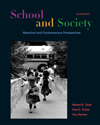 |  School and Society: Historical and Contemporary Perspectives, 4/e Stephen E. Tozer,
The University of Illinois, Chicago
Paul C. Violas
Guy Senese,
Northern Arizona University
Diversity and Equity: Schooling and African Americans
Learning ObjectivesAmong the objectives that Chapter 6 seeks to achieve are these:
| Students should understand selected dimensions of African American history immediately following the Civil War. In particular, students should consider the nature of the racist oppression that was supported by legal measures taken in that period. |
 |  |  | | Students can begin to assess the degree to which political and economic power can be wielded purposefully to the advantage of some groups at the extreme expense of others, and that progress, contrary to classical liberal views, is not always inevitable. |
 |  |  | | Students should begin to assess the degree to which African Americans themselves effectively took responsibility for their own education following the Civil War, and the degree to which the efforts of whites interfered with black educational achievements. |
 |  |  | | Students should be equipped to evaluate the degree to which, in the context of racist political economy and ideology, Booker T. Washington's educational solutions adequately served the interests of African Americans. |
 |  |  | | Students should also assess the degree to which Washington's faith in social reform through educational means was adequate. |
 |  |  | | Students should be equipped to evaluate the critique of Washington and others formulated by W. E. B. Du Bois, and to intelligently discuss whether Du Bois's assessment of the problems of African Americans was more or less adequate than Washington's assessment. |
|



 2002 McGraw-Hill Higher Education
2002 McGraw-Hill Higher Education